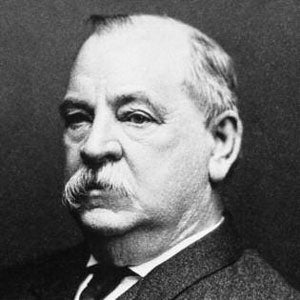Grover Cleveland
22nd and 24th president - 1885-1889; 1893-1897

The only president to serve two non-consecutive terms – and for that reason generally counted as two presidents rather than one – Cleveland was also the first president to live some of his life in the 20th century. Born in New Jersey, he spent his early years in Buffalo, New York, where, after practising as a lawyer, he held various minor public offices before becoming governor of New York in 1882. His reputation for fearless honesty helped him to become the first Democrat to be elected to the White House since the Civil War.
As president, he discouraged patronage and barred favours to economic special interest groups. He also vetoed many private pension bills to Civil War veterans with dubious claims. By the end of his second term, he had used the veto more than all his predecessors combined.
Such obstinacy made him enemies. He angered the railroads by ordering an investigation of western lands that they held by Government grant, ultimately forcing them to return 81 million acres. He also signed the first law attempting Federal regulation of the railroads.
In December 1887, he called on Congress to reduce high protective tariffs. Told that this would create political capital for the Republicans, he replied: "What is the use of being elected or re-elected unless you stand for something?"
He was probably not entirely surprised at his defeat in the 1888 election (although he won the popular vote). But his young wife, Frances, whom he had married in the White House in 1886 (after acting as her guardian for a decade), warned staff there to take good care of the furniture, as "we are coming back four years from today."
She was right, but Cleveland's second term was less successful than his first. Shortly after he returned to office, the stock market was struck by the Panic of 1893, and soon the economy was in depression. Cleveland's hands-off approach did little to ease the pain. He dealt directly with the Treasury crisis rather than with business failures, farm mortgage foreclosures and unemployment. He obtained repeal of the mildly inflationary Sherman Silver Purchase Act and, with the aid of Wall Street, maintained the Treasury's gold reserve.
His hardline response to industrial unrest won admirers in some quarters. "If it takes the entire army and navy of the United States to deliver a postcard in Chicago," he said when sending federal troops to break a railroad strike, "that card will be delivered." But, in general, his reaction to the depression and its challenges was unpopular, and by 1896 even his own party had deserted him, nominating William Jennings Bryan instead.
A large, moody, serious man, Cleveland might have been treated more kindly by history had he limited himself to a single term. But his foreign policy was well-thought-of – he forced the UK to accept arbitration of a disputed boundary in Venezuela – while his repeal of the Tenure of Office Act, combined with his fearless use of the veto, did much to re-establish the power and prestige of the presidency.
After leaving the White House, Cleveland lived quietly in retirement in Princeton, New Jersey. He died in 1908. Not until 1917 was it revealed that, in 1893, at the height of the financial panic, Cleveland had secretly undergone a major operation for cancer of the jaw while on a friend's yacht. Desperate not to see public confidence undermined further, the White House insisted that he had merely had minor dental treatment. It is arguable that this white lie was as important a contribution to the nation's well-being as many of his better-known acts of integrity.
In his words
"The lessons of paternalism ought to be unlearnt and the better lesson taught that, while the people should patriotically and cheerfully support their Government, its functions do not include the support of the people."
In others' words
"In the midst of the shifting scene Mr Cleveland personally came to seem the only fixed point. He alone stood firm and gave definite utterance to principles intelligible to all." Woodrow Wilson
Minutiae
Cleveland was drafted to fight in the Civil War but paid a 32-year-old Polish immigrant to serve in his place.
His first bid for the presidency was nearly derailed by a sex scandal. The press discovered that, as a 37-year-old bachelor, he had accepted responsibility for the paternity of a child born out of wedlock. When his aides asked him for a response to the lurid headlines, he said simply: "Tell them the truth." The public were impressed with his honesty, and the damage was limited.
As Sheriff of Eric County, New York, he personally hanged two men, putting the noose round their necks and pulling the trap himself. He believed that this was more honest than paying someone else to perform the deed for him.
Subscribe to Independent Premium to bookmark this article
Want to bookmark your favourite articles and stories to read or reference later? Start your Independent Premium subscription today.

Join our commenting forum
Join thought-provoking conversations, follow other Independent readers and see their replies